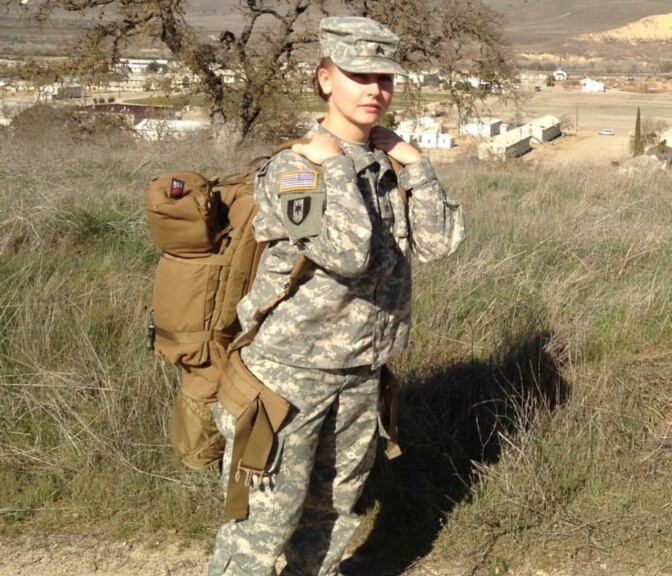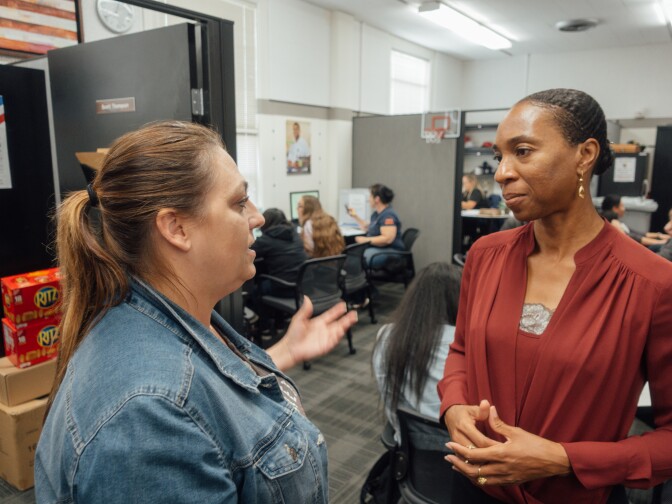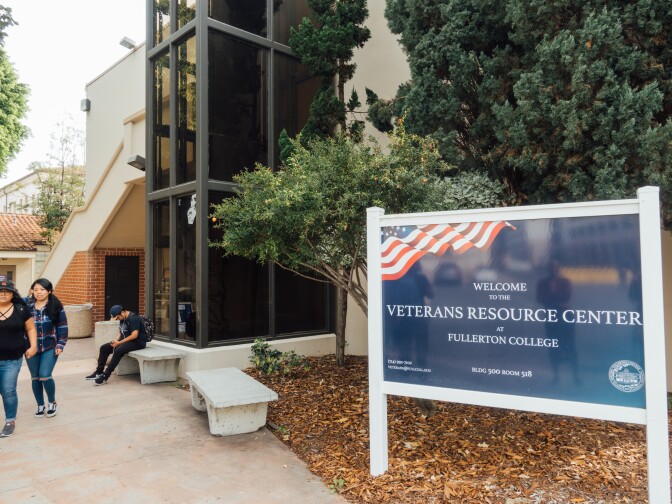This story is free to read because readers choose to support LAist. If you find value in independent local reporting, make a donation to power our newsroom today.
This archival content was originally written for and published on KPCC.org. Keep in mind that links and images may no longer work — and references may be outdated.
The plan to get women vets to use more health services
Denise Berry remembers the day a mortar blew up part of the hospital in Iraq where she was working as a U.S. Army combat medic.
The explosion claimed a person in a portable toilet next to her, blew up her truck, and made the ambulance she was working underneath, doing a maintenance check, bounce on top of her.
"I am lucky to be alive," Berry said.
She woke up a while later, unsure how long she’d been unconscious. Berry suffered memory loss related to traumatic brain injury, and later, symptoms of PTSD.
After demobilizing and leaving the service, Berry waited. Despite worsening mental health effects from the bombing and her time working in the high-stress environments of emergency rooms and prisons in Iraq, she hesitated to reach out.
"The resources didn’t come to you. So if you weren’t a very proactive person, you weren’t going to get any help," she said. "And I would have to say that’s for most veterans coming back."
The same thing that made her successful on deployment — the strength to keep it together and handle any obstacle that came her way — motivated Berry try to tough out the disturbing dreams and anxiety alone.
She also wondered why her difficulties deserved attention ahead of scores of wounded servicemembers. Berry remembered thinking, "how could I possibly receive benefits when this person over here is dealing with the ramifications of Agent Orange, or lost a leg?"

Opening up combat jobs to women in the military is bringing a greater need for resources to treat the trauma and mental health challenges that echo after service.
But the National Institutes of Health has found women veterans underutilize VA health care compared with men. It says many report delaying getting care, and that when they do receive treatment, it's inadequate. Other women aren't seeking help at all, according to the government researchers.
A group of nonprofits is testing a new outreach program in Los Angeles County, dubbed Women Vets on Point, which aims to overcome the barriers keeping female veterans from connecting with services.
Experts say there are many possible reasons women don't avail themselves of veteran-specific resources. They may not think of themselves as part of a veteran community that’s dominated by men. Parenthood duties often fall to women and make it difficult to find time to reach out or travel for care. And many women have experienced sexual assault or harassment while serving, an experience that alienates them from military institutions that may have protected their assailants.
The VA has made strides in welcoming the growing number of female veterans and addressing their unique health needs. But for some, the system still feels like a testosterone-only space.
"Male veterans, their style of banter and communication is very different," said Dr. Miatta Snetter, a clinical psychologist with the housing and services nonprofit U.S.VETS. "Sometimes it can be triggering for female veterans, and they don’t feel comfortable being in that kind of an environment."
U.S.VETS and Education Development Center (EDC), a nonprofit research organization, are partnering to develop and test Women Vets on Point.
The program is meant to specifically serve women veterans’ needs by overcoming barriers to care, and connect veterans with a range of services in their community, including mental healthcare, substance abuse treatment, childcare, professional development and educational resources.
One of those services is a U.S.VETS program called Outside the Wire, in which Snetter works with student veterans providing counseling and mental health services on college campuses in Orange County.
She’d like more women to knock on her office door.
"Oftentimes even in civilian populations, females are more of the nurturers. They’re more apt to take care of others," she said. "They see the problems and concerns that others have, and [don’t] really seek help for themselves."
As part of its pilot program, Women Vets on Point is building a network of partners that have resources for veterans, and will offer small grants to help improve or tailor that care for women vets.
"There are a lot of clinicians who would love to be able to provide services to female veterans," Snetter said. "They don’t know how."
The biggest outreach tool will be a new website, ideally a one-stop-shop for female veterans to find resources.
"To educate, to connect people, to help people choose what they want to do next in their own time, when they’re ready," said Rebecca Stoeckle with EDC.
EDC's research has shown peer-to-peer encouragement is an important motivator for female veterans seeking help, so they're tapping interviews and focus groups to develop a site women will feel comfortable sharing with their social network.
With these goals in mind, Stoeckle said the biggest challenge is to restore trust in the help that’s available.
Some women veterans feel the system has let them down. They weren’t taken seriously when they suffered mental health difficulties, or the effects of military sexual harassment and assault.
When Denise Berry finally went to the VA to address her own psychological wounds of war, she felt her doctors saw a fresh-faced young woman—not a veteran recovering from warzone trauma.
"The first psychiatrist I went to kind of rolled their eyes at me, and said ‘you know, I really don’t know why you’re wasting my time, because there’s nothing wrong with you.’" Berry said.
"We need to do better than that," Stoeckle said.
After an initial testing period, the developers of Women Vets on Point want to expand the program nationwide. They hope a new kind of outreach spearheaded by community nonprofits outside the VA system may be the on-ramp women need to get back into care, or start it for the first time.
"Because we are an entity that is not the VA, per say, we may have an opportunity to reopen those doors," Stoeckle said.
This story was produced by the American Homefront Project -- a collaboration of North Carolina Public Radio-WUNC, Southern California Public Radio-KPCC, WUSF-Tampa, KPBS-San Diego, Texas Public Radio and North Country Public Radio.










